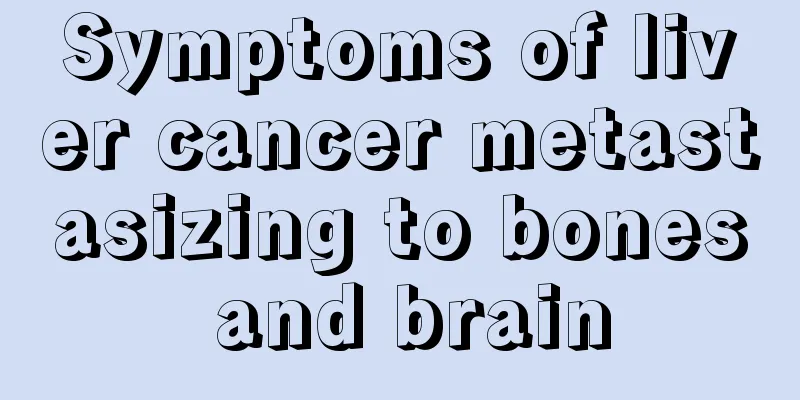What are the early symptoms of colon cancer

|
Early symptoms of colon cancer may include changes in bowel habits, blood in the stool, abdominal pain, bloating, etc. If you experience the above discomfort, you should see a doctor as soon as possible. The following will analyze these symptoms and their patterns in detail, and provide health advice to effectively raise awareness of prevention and early screening. 1. Changes in bowel habits People with early-stage colon cancer may find that their bowel habits have become abnormal, such as increased or decreased bowel movement frequency, persistent diarrhea alternating with constipation, and thinner stools. These symptoms are often related to the obstruction or irritation of the intestinal cavity caused by the growth of tumors in the colon. Once abnormal bowel movements persist for more than two weeks, it is recommended to undergo a colonoscopy in time to detect potential problems and intervene as soon as possible. 2. Blood in stool or occult blood in stool When a tumor proliferates in the colon, it may cause damage to the intestinal mucosa, resulting in blood in the stool or occult blood in the stool. This type of blood in the stool is mostly dark red or black and does not cause obvious pain, which is different from the bright red blood in the stool caused by hemorrhoids. The cause can be determined through fecal occult blood tests or colonoscopy. If there is long-term blood in the stool, you should seek medical attention immediately to avoid delaying diagnosis. 3. Abdominal pain, bloating and discomfort The gradual enlargement of the tumor may cause local intestinal obstruction, resulting in abdominal bloating, dull pain or cramps. Some patients feel a sense of heaviness in the abdomen, especially after meals or before defecation. If such symptoms do not tend to improve and the possibility of finding a clear cause is small, further imaging examinations are needed to confirm the diagnosis. 4. Weight loss and anemia Due to the consumption of the tumor and chronic blood loss, some patients will show unexplained weight loss and pale complexion, and even fatigue in the early stage. These "systemic" symptoms indicate that the body may have chronic diseases. It is necessary to pay attention to whether it is related to malignant tumors of the digestive tract, and confirm it through comprehensive blood tests and gastrointestinal scans. 5Other manifestations Other early manifestations of colon cancer may include decreased body resistance, loss of appetite, persistent nausea and vomiting, etc. Although these symptoms are not specific enough, you still need to be vigilant when combined with other digestive tract symptoms. Early detection of colon cancer is the key to improving treatment effectiveness and survival rates. If the above symptoms persist and show important signals, a colonoscopy should be performed to confirm the diagnosis. If necessary, imaging examinations and pathological biopsies should be used for further diagnosis. A healthy diet, high fiber intake, and regular physical examinations can effectively prevent the occurrence and development of colon cancer. Actively managing health is the key to preventing problems before they occur! |
<<: What causes uterine teratoma
>>: Can CT detect esophageal cancer?
Recommend
Why do I always feel thirsty during confinement?
It is normal to always feel thirsty after giving ...
Which is better, Tieguanyin or Maojian
Friends who like to drink tea know that there are...
How to deal with pencil puncture wounds
This condition can be caused by damage to the cor...
What are the symptoms of nasopharyngeal cancer
Many diseases will not be that difficult to treat...
Emu oil's effects and functions
Emu oil is a common necessity in the lives of ord...
Will bile duct cancer be passed on to the next generation after it is cured?
The age distribution of cholangiocarcinoma in my ...
Chin acne is actually related to these five reasons
Acne on the chin is a common phenomenon in daily ...
How to distinguish the quality of toothpaste
Many people use toothpaste frequently in their da...
Distribution of gastric cancer incidence in my country
Gastric cancer originates from the mucosal epithe...
Are foreign men really good?
When it comes to men, do women prefer the mighty ...
What is desensitization therapy
If you have ever suffered from an allergic diseas...
What can make your skin whiter_What can make your skin whiter
There are many ways to whiten the skin. If you ma...
How is glaucoma caused?
We all need to pay attention to the causes of gla...
Is the gray-gray vegetable poisonous? What should we pay attention to?
The saying that the gray-gray vegetable is poison...
How long does it take for impetigo to heal
Impetigo is a skin disease that is relatively com...









